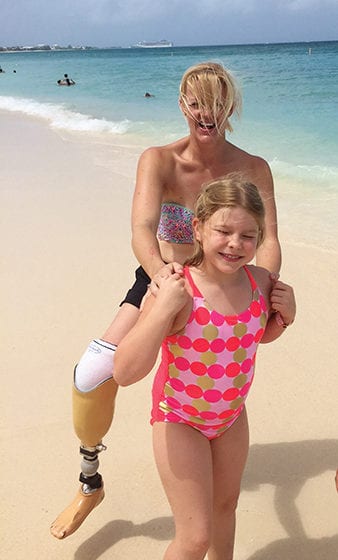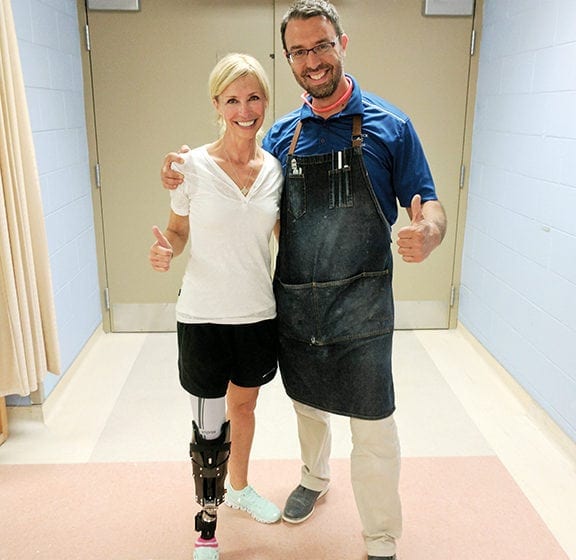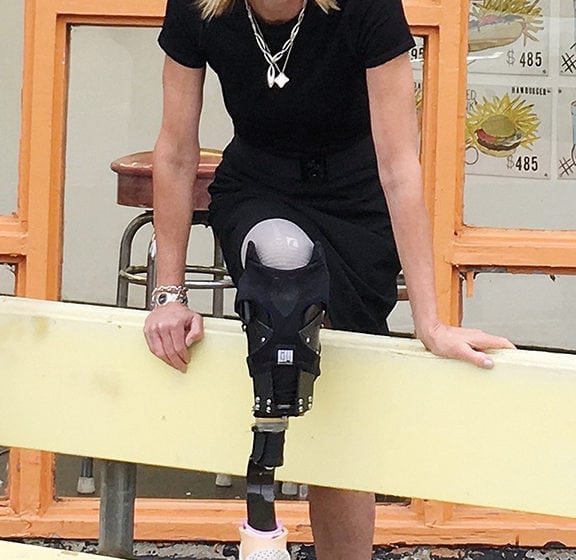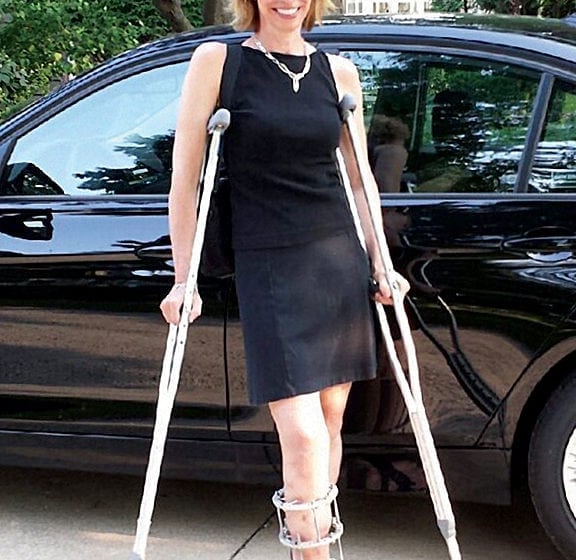“It was not my disease that nearly bankrupted me. It was the sheer cost of healthcare, coupled with overbilling and multiple fraudulent lawsuits over billing mistakes, which destroyed my credit and threatened my ability to survive.”
Jessica Peck is a survivor. Born with arteriovenous malformations (AVMs) that were diagnosed when she was 5 years old, she endured dozens of surgeries over the next 30 years to stop the progression. “Over the last five years, I have suffered devastating setbacks, including bone loss and pulmonary embolisms as the result of the AVM, coupled with a rare neurological ailment called reflexive sympathetic dystrophy,” she says. In 2015, Peck had her right leg amputated below the knee to improve her quality of life, including reducing pain and complications associated with the aggressive bone loss. At that moment, Peck explains, her whole world changed—and not only because of the physical effects of the amputation.
“As a journalist-turned-lawyer, I’ve always loved being a voice for the little guy. Then I became the little guy,” she says. “Before I got sick, I had a dream life—two great kids and I traveled the world. I had a successful law practice and owned two houses. Since getting sick, I’ve had five insurance companies in five years and was on Medicaid. In the five years of being sick and living in and out of hospitals, I lost my entire life savings and assets. There were days I couldn’t even put gas in my car. I don’t know what I’ll do moving forward to fund the treatments I need to prevent the loss of the rest of my leg. I don’t have the tens of thousands of dollars in the bank like I used to.”

Peck estimates she will need $60,000 a year to fund her treatments, wheelchair, spinal implants, and prostheses. Understandably, she is concerned about her future, both medically and financially.
“Being an amputee is very unique as far as medical challenges,” says Peck. “When you’re missing a limb, people treat you differently. After years in a wheelchair, I started walking again on a prosthetic leg in March. After I walked my first real set of stairs in Havana, Cuba, this past April, I realized people don’t see me as broken anymore. My prosthesis makes me intriguing, where once people looked away from me when they saw the absence of a body part. After hiding in a wheelchair too long, I’m proud of my battle wounds and prosthetic leg. I feel unstoppable—even in the face of an uncertain future.”
Challenges to Care
Having faced similar challenges, many amputees can empathize with Peck. Even if you’ve won your own battle with health insurance and coverage for prosthetic limbs, your personal battles and the bigger war are ongoing. Many concerns and fears that arise can include:
- Threats to coverage for prosthetic devices
- Potential loss of pre-existing condition protections
- Potential limits or caps on health insurance coverage
- Excessive hospitalization costs
- Exorbitant out-of-network bills
- Steep increases in the costs of prescription drugs
- Inadequate insurance coverage for physical therapy (PT), occupational therapy (OT), and other treatments
- Potential changes to Medicare insurance benefits
Peck says she fears all of the above and then some. “The worst and most disgraceful part is how much time and money I spend combatting billing mistakes and fraud,” she explains. “I’ve been sued over copays that I’d already paid. I’ve fought to remove billing errors from my personal credit report, only to have them reappear. I’ve shown up in court to fight collections lawsuits only to discover I was served a summons for cases that were never filed.”

She adds that any money potentially recouped in court could never compensate for the time she’s spent or for the negative impact to her credit, her reputation as a lawyer, or her sanity.
Denials and Delays
Deborah Smith, of Western Springs, Illinois, a suburb of Chicago, is also concerned about such issues and adds, “PT is important for those with limb loss as we need to relearn how to walk and function using a prosthesis.”
Smith is a recent amputee, although her injury occurred many years ago. When she was 19, a motor vehicle crash caused tremendous damage to her right leg. In 2015, more than three decades and several dozen limb-salvaging surgeries later, Smith made the tough decision to have her right leg amputated below the knee while she was in the middle of a difficult divorce. She says the financial issues that ensued were debilitating.
“It was the medical deductibles and other medical expenses, but it also was a struggle to meet my basic living expenses at the time,” Smith says, adding that friends started a GoFundMe page to help with her unreimbursed medical expenses.“At the time, I was unemployed and actively interviewing for jobs, while struggling financially to pay the monthly premiums for my private health insurance.”
Smith says she did her due diligence before she scheduled her elective amputation surgery. But neither checking benefits immediately before surgery nor pre-authorization is a guarantee of coverage. As many amputees discover, insurance companies often deny claims based on “medical necessity.”
“Before I went ahead with the elective amputation surgery, I checked my coverage for prosthetic devices, which were listed as a covered benefit. More than $100,000 in billing claims for my amputation and a subsequent revision surgery were covered without question. Yet when my prosthetic leg was billed, the claim was denied, stating ‘not medically necessary.’”

While awaiting a decision on her appeal, Smith says she was grateful that her prosthetist allowed her to use her walking leg to get around to job interviews and manage her day-to-day life. He also helped her claim by providing whatever documentation was necessary to help her win her appeal. And he did another amazing thing.
“As my insurer denied my claim for a leg to enable me to walk again without crutches or a walker, my prosthetist donated his time and materials to make me a running prosthesis so I could run again, which was a dream come true.”
Since denials are the norm rather than the exception, good-hearted prosthetists and physiatrists often fill in where health insurance falls short for their patients by donating their time, services, and sometimes even prostheses.
“Losing a limb is a traumatic, stressful, emotional event under the best of circumstances. Delays in access to prosthetic devices exacerbates its impact and [hinders the] ability for people to move forward with their lives after losing a limb,” explains Smith. “My prosthetic leg has enabled me to do things, physically, I never would have imagined or have been able to do with my natural salvaged limb. I now run again, golf, and sail. Plus, I have a rewarding career. My prosthetic leg has increased my confidence, improved my quality of life, and allowed me to move forward with my life. I feel whole now.”
In her job as Midwest territory manager for LIM Innovations, a prosthetics innovator, Smith says she witnesses the physical and emotional impact of delays in care and the stress of financial difficulties on her clients. Insurance coverage and denials are a big part of that equation.
“Some insurance companies and policymakers too often take a penny-wise, pound-foolish approach to prosthetic devices,” Smith says. “Coverage can dictate health and lifestyle decisions for people who need prosthetic devices. Choices are sadly often made based on reimbursement rates rather than potential positive outcomes for the patient. Denials and delays to accessing prosthetic devices can have an impact on comorbidity issues, such as weight gain, pain, and pain management, plus an increased risk of depression.”

Amputee Advocacy
Besides advocating for their own medical coverage, Smith and Peck pay it forward. Smith, who is also a 9-year oral cancer survivor, is a peer mentor for new amputees, amputee athletes, and cancer survivors. Both are involved in advocating for the bigger picture—the war, so to speak, not just their own personal battles but also helping the cause. “It is critical to be an advocate today as healthcare changes are being discussed that would negatively impact people with limb loss seeking to attain adequate prosthetic care,” says Smith.
A well-known attorney and outspoken civil rights advocate, Peck learned she could use her influence for philanthropic efforts. “As I got sicker, I found my path to sanity in becoming a voice for the disabled. My practice shifted into one that vigorously advocates for families suffering the effects of physical and mental illness, as well as against atrocities associated with skyrocketing medical costs and billing fraud. I have fought for wheelchair ramps, functional elevators, handicapped parking compliance, and against medical billing fraud. After everything I’ve been through, I feel a true obligation to combat the bullying—or even plain ignorance—that destroys the right and opportunities of the sick.”
Peck acknowledges that she doesn’t have all the answers to fix the system, but she does have ideas. “I think stronger protections against billing fraud would be a start,” she says. “As I get back on my feet—both literally and figuratively—I dream of [starting] a legal resource center to arm patients with the tools to transform our system into one where billing fraud is punished—and severely.”
Since the amputee population is a relatively small group, it must be loud and strong to get attention. One way amputees can enhance their impact is through working with related groups when they have common goals, such as struggling for disability rights or better healthcare legislation. Here are some groups you can work with to help make a difference:
- Amputee Coalition (www.amputee-coalition.org)
- American Cancer Society (www.cancer.org)
- American Diabetes Association (www.diabetes.org)
- AARP (www.aarp.org)
- Medicare Rights Center (www.medicarerights.org)
- Coalition to Protect America’s Health Care (www.protecthealthcare.org)
- amp’d (www.ampdpod.com)

For more information about saving money on your healthcare, see pgs. 5-6.
Challenged Athletes Foundation
www.challengedathletes.org/programs/grants
Chariots of Hope
www.chariotsofhope.org
Direct Relief International
www.directrelief.org
The Kids Equipment Network
www.tken.org
Kids Mobility Network
www.kidsmobility.org
Orphaned Wheelchairs and The Wheelchair Foundation
www.wheelchairfoundation.org
Outdoor Ability Foundation
www.outdoorabilityfoundation.com
Wheelchair of Hope Foundation
www.wheelchairofhope.ca



